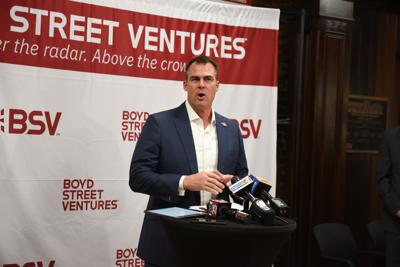OKLAHOMA CITY — Lawmakers shouldn’t spend $2 billion for “special interest” projects unless they’re also prepared to pass a grocery tax cut that would save every Oklahoma family hundreds of dollars each year, the governor said Tuesday.
Gov. Kevin Stitt said it “sends a poor message” to spend $2 billion without also cutting the grocery tax.
“I just don’t think it’s the right time to spend $2 billion when we won’t at least cut grocery taxes for Oklahomans,” Stitt said. “Think about it, spending $2 billion for different special interests, different groups around the state, different projects. That doesn’t help a mom or dad going to the grocery store.”
The Republican’s remarks came on the eve of a three-day special session where lawmakers are poised to rubberstamp spending over $1.7 billion in federal coronavirus aid as well as taxpayers funds earmarked for economic development improvements at industrial sites across the state.
His public plea also comes as the Republican-controlled Senate announced it would not consider any tax relief despite a “buffet” of legislation passed by the state House setting the stage for such action.
Stitt said inflation is near 40-year highs. While state coffers are flush with $3 billion in savings and another $1 billion surplus expected, Oklahomans are grappling with soaring energy and food prices. Interest rates are soaring, the stock market is sagging and Oklahomans are losing money in their retirement accounts and investments and have postponed retirements.
“Oklahomans are hurting,” Stitt said.
Oklahoma is one of only 13 states that still taxes groceries and does so at one of the highest rates, he said. The tax is regressive in that it harms people who make less because they have to spend a higher percentage of their income on groceries.
Stitt said he’s confident that the majority of people in the state Capitol want to get it done, and urged voters to “put pressure” on their legislators to ensure it happens. He doesn’t believe Oklahoma is on the brink of a recession, though noted that the stock market is in a period of decline. He said with its diversified economy, the state is in a great position.
“I would never put Oklahomans in a bad situation,” he said, adding that the state needs to invest strategically, and the state has saved in the event of a future economic downturn.
State Senate leadership, though, issued a joint statement insisting the state has already entered a recession, and noted that it is expected to be “durable and painful.” They urged caution in implementing new tax cuts.
Senate President Pro Tem Greg Treat, R-Oklahoma City, said he’s for lower taxes, and previously championed tax cuts. He said he also is proud to be part of the legislative leadership team that has contributed to current record savings, and made critical investments into essential services “while living within our means.”
“As we enter a recession, we must remember just a few short years ago we were scrambling with a $1.3 billion shortfall,” Treat said in a statement. “We must be mindful and do tax cuts the right way.”
He said there’s a tax policy working group that is “making serious strides to a long-term, sustainable plan to responsibly cut and reform taxes in our state.”
State Sen. Roger Thompson, R-Okemah, said “economists predict this recession is going to be durable and painful” and urged “a deliberate approach” to tax reform.
And state Sen. Julie Daniels, R-Bartlesville, said there is “reckless spending on the federal level that is leading the country in the wrong direction.
“Doing tax cuts wrong will put the burden on the backs of Oklahomans for generations,” she said. “Our tax working group is examining our tax code to determine the best way to cut taxes for citizens of our state.”
The joint statement did not address Stitt’s claim that spending $2 billion with no direct inflation relief for Oklahoma families sends a “poor message.”
Cutting the grocery tax has bipartisan legislative support. In June, the House passed what it called a “buffet of bills” containing over $500 million in tax cuts as part of a comprehensive inflation relief package.
Local grocery tax rates would remain intact, though some measures passed by the state House would prohibit municipalities and counties from attempting to increase grocery tax rates while the state’s moratorium remained in effect.
Any temporary tax cuts would last two years. Senators also have the option to increase the state’s grocery sales tax credit from $40 to $200.
“The House has been leading on and passing inflation relief for two years now, and stands ready to act yet again to deliver the relief the governor is fighting for and Oklahomans deserve,” Speaker Charles McCall, R-Atoka, said Tuesday in a statement.
State Rep. Monroe Nichols, D-Tulsa, said cutting the grocery tax has long been a Democrat priority. He said such cuts are now polling well during the mid-term election year.
Nichols said there’s never “a good time to spend money on pet projects” but it’s important that Oklahoma spend federal coronavirus resources to shore up neglected infrastructure and on projects that help Oklahomans recover from the pandemic.
Still, he said he finds it interesting that a governor whose own party holds the biggest Republican majority in state history can’t get his tax cut priority “across the finish line.”
“It is remarkable that a Republican governor in a state where you have the biggest supermajorities, in a state that is blood red, can’t get enough Republicans to work with him to get stuff done,” Nichols said.
He said Stitt won’t work with Democrats, and Republicans won’t work with Stitt.

















Commented
Sorry, there are no recent results for popular commented articles.